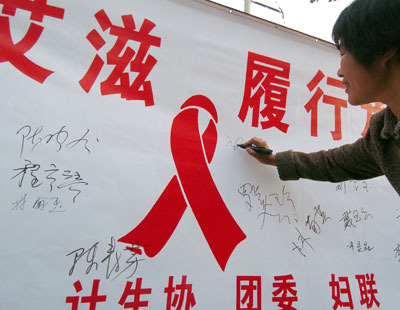|
New pledge to control spread of HIV/AIDS
(China Daily/Reuters)
Updated: 2005-12-01 05:59
China will contain the number of HIV carriers to less than 1.5 million by the
end of 2010, Health Minister Gao Qiang pledged yesterday on the eve of World
AIDS Day.
The central government is spending 800 million yuan (US$99 million) on
prevention efforts this year, up from 100 million yuan in 2002, the minister
said, adding that China was capable of effectively containing the spread of the
virus.
|

A resident signs on a banner to promote the
prevention of HIV/AIDS in Fuzhou, East China's Fujian Province November
30, 2005. [Xinhua]
|
"AIDS prevention is an issue related to the quality of the population,
economic development, social stability and the rise or decline of the country,"
Gao told a news conference.
The number of HIV carriers in the country was estimated at 840,000 at the end
of last year following an investigation by the ministry and the World Health
Organization (WHO).
But there were only 135,630 cases, including 31,143 AIDS patients, registered
till the end of September, which means a majority of HIV carriers who may or may
not know they are infected have not been identified.
Gao said that the ministry and the WHO estimate that China has 70,000 AIDS
patients.
Some experts have warned that if no effective measures are taken immediately,
the number of HIV carriers in the country could increase to 10 million in 2010.
China started to move aggressively against the disease in the late 1990s when
outbreaks were found among blood sellers.
As the virus spread, government funding also increased rapidly: In 1997, only
about 20 million yuan (US$2.4 million) was spent on AIDS prevention and control;
this year, the figure has risen 40-fold.
The virus, which first appeared in 1985, has spread to all 31 provinces and
regions on the Chinese mainland.
Of the infected cases, people who sold blood in the early 1990s in such
provinces as Henan, Shanxi and Sichuan account for 23 per cent; drug abusers, 40
per cent; and those who indulge in unsafe sex, 9 per cent. It is not clear how
the remaining contracted the disease.
While cases of infection through blood transmission have come down since the
late 1990s, health authorities are worried about drug abuse and unsafe
commercial sex, which are illegal and hard to monitor.
Unsafe sexual contact will become a major channel for the spread of HIV/AIDS
from high-risk groups to the general public, Gao warned.
|